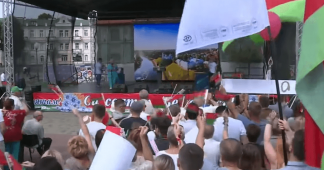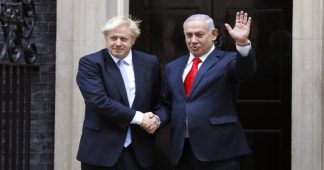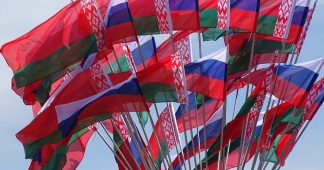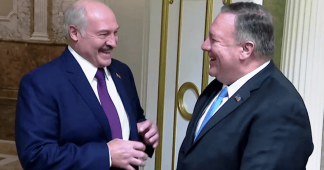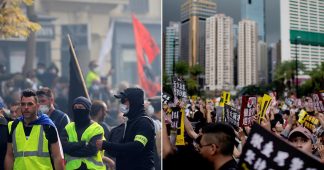The National Endowment for Democracy can claim it is in the business of democracy promotion. In reality, it does anything but that, unless “democracy” is entirely synonymous with elite U.S. interests.
by Alan Macleod
Feb 18, 2022
KIEV, UKRAINE – Amid soaring tensions with Russia, the United States is spending a fortune on foreign interference campaigns in Ukraine. Washington’s regime-change arm, the National Endowment for Democracy (NED), has spent $22.4 million on operations inside the country since 2014, when democratically-elected President Viktor Yanukovych was overthrown and replaced by a successor government handpicked by the U.S. Those operations included propping up and training pro-Western political parties, funding pliant media organizations, and subsidizing massive privatization drives that benefit foreign multinational corporations, all in an effort to secure U.S. control over the country that NED President Carl Gershman called “the biggest prize” in Europe.
Demwashing the CIA
The National Endowment for Democracy was set up in 1983 by the Reagan administration after a series of public scandals had seriously undermined both the credibility and the public image of the CIA. That the organization was established and continues to function as a cutout group doing much of the agency’s dirtiest work is not in question. “It would be terrible for democratic groups around the world to be seen as subsidized by the CIA,” Gershman himself said, explaining its creation. “A lot of what we do today was done covertly 25 years ago by the CIA,” NED cofounder Allen Weinstein told The Washington Post in 1991.
Since its inception, NED has been a driving force behind many of the most prominent uprisings and coups around the world. The organization currently has 40 active projects in Belarus, all with the goal of removing President Alexander Lukashenko from office. Last year, the country was engulfed by nationwide protests that made worldwide headlines. NED senior Europe Program officer, Nina Ognianova, boasted that her agency was involved in the uprising. “We don’t think that this movement that is so impressive and so inspiring came out of nowhere — that it just happened overnight,” she said, noting that NED had made a “modest but significant contribution” to the protests.
The 2021 protest movement in Cuba was also led by NED-financed operatives, with the organization’s own documents showing how it had for years been infiltrating the Cuban art and music scene in an attempt to turn popular culture against the communist government. Ultimately, the movement failed. However, NED continues to prop up anti-government Cuban artists, media outlets, politicians and public figures.
NED was also funneling money to the leaders of the 2019 Hong Kong protests in an attempt to prolong the movement. “The organization and its partner will leverage their extensive existing networks to support exiled activists and to sustain and grow activist communities remaining in Hong Kong,” one NED grant explains, adding that a secondary goal was to “strengthen regional and international support for the pro-democracy movement,” by carrying out a worldwide PR campaign promoting it, something that might help explain why the events dominated the news cycle for months.
Meanwhile, NED has also channeled millions to right-wing opposition groups in Nicaragua and even organized rock concerts in Venezuela in an effort to undermine support for its socialist government.
While NED is careful to couch all of its activities in the language of “democracy promotion,” the fact that it has never carried out a single project in the U.S.-backed Gulf dictatorships of Saudi Arabia, Qatar, Bahrain, Oman, or the United Arab Emirates — some of the least democratic nations in the world — underlines that the organization exists to antagonize enemy governments.
NED is almost entirely funded by Congress and is staffed largely by ex-national security state leaders. Its current president is Damon Wilson, former special assistant to President George W. Bush and senior director for European affairs at the National Security Council. Other top officials pepper NED’s board of directors, including current CIA Director William J. Burns, current Under Secretary of State for Political Affairs and 2014 Ukrainian Maidan revolution mastermind Victoria Nuland, as well as veteran national security official Elliott Abrams, infamous for his role in supplying weapons to far-right death squads in Central America and his attempts to overthrow the government of Venezuela.
Despite this, NED still insists that it is a private, non-profit, non-governmental organization. One key reason for this designation is that its private nature means that its affairs do not fall under the same legal scrutiny as those of government organizations like the CIA. It is harder to acquire documents under the Freedom of Information Act, for example, meaning that the group’s actions remain shrouded in secrecy.
Economic and political capture, NED-style
Studying the NED grants database reveals that the organization has approved 334 separate grants to Ukraine, a country the group’s 2019 annual report identified as its “top priority,” owing to “its size and importance for the Europe region.” The report notes that NED is focused on “counter[ing] foreign [i.e., Russian] malign influence, particularly disinformation and corrosive capital.” Of the European nations, only Russia itself has been the target of more NED money ($37.7 million to Ukraine’s $22.4 million).
NED is rather hazy about where its money is going, with the only clues being brief, one-paragraph descriptions (rarely longer than 75 words) full of boilerplate rhetoric. Yet scrutinizing even the vague project outlines, it becomes clear that NED has two major objectives in Ukraine:
- Pushing through a mass privatization of the country’s state-owned businesses.
- Building up political parties that will represent elite U.S. interests.
Of the $22.4 million, over $2.9 million has been awarded to the Center for International Private Enterprise (CIPE), an offshoot of the U.S. Chamber of Commerce, for the purpose of “sparking economic transformation” in Ukraine. What sort of transformation the CIPE wants to see is made clear on its website, which states categorically that “Free market capitalism and global trade have resulted in the greatest economic gains in human history,” and that the center’s role is to further free market penetration around the world.
For instance, one NED grant to the CIPE — worth $500,000 and entitled “Developing [a] Market Economy” — described the project’s goal as “enhanc[ing] the role of leading business associations and the private sector in public policy decision-making, and improv[ing] the capacity of the private sector and officials to cooperate to develop and implement economic reforms.” In other words, to hand over government decision-making to big business, something many might argue is the antithesis of democracy.
The post-2014 government, installed after the Maidan Revolution, has already implemented a course of economic shock therapy, selling off many of the country’s state-owned assets, in the process turning Ukraine into, by quite some margin, the poorest nation in Europe (although it has also helped create many new billionaires). Nevertheless, the U.S. wants to see further privatizations, along the lines of what it helped implement in Russia in the 1990s.
NED has also been key in building up pro-U.S. political forces in Ukraine, notably awarding the National Democratic Institute for International Affairs (NDI) nearly $2.2 million towards this endeavor. Congress established NDI in tandem with NED; and NDI, like its sister organization, claims to be a non-governmental organization, despite being affiliated with the Democratic Party. Its chairperson is Madeline Albright, secretary of state under the Clinton administration.
One $595,000 grant describes how NDI will “help political parties develop into inclusive, national movements,” and will “assist parties in the development of inclusive, internal communication and decision making procedures” and “conduct public opinion research and trainings to help parties better understand and respond to citizens, including those outside of their traditional geographical bases of support.” A less charitable interpretation of the grant would be that the U.S. government is taking over the political direction and organization of Ukrainian political parties, molding them as they see fit.
In tandem with the support of political blocs also comes the grooming of young political and social activists who NED hopes will become the leaders of tomorrow. To this end, it has given at least $385,000 to the European Institute for Democracy in Warsaw, in order to, in its words, “support a new generation of political leaders in Ukraine,” by conducting training courses for their handpicked proteges, flying them out of the country to provide lessons in “election campaigning, women empowerment, effective governing, and crisis management,” among other skills.
The point, of course, is to develop a cadre of pro-Western neoliberal thought leaders who will ally themselves to the United States and its vision for Ukraine. Left unstated in all this is that the U.S. is deciding who exactly this new generation of leaders comprises. And for all the nods towards diversity and liberalism, the U.S.’ record in Eastern Europe shows they are happy to support fascists and other highly anti-democratic forces. Those who do not share Washington’s goals for Ukraine need not apply. Thus, by using its financial muscle to support only one side in this debate, NED hopes to engineer a future in which pro-Russia, anti-privatization political figures and movements are sidelined and marginalized.
Media capture, NED-style
Another key focus for NED is to establish and support pro-Western media outlets and NGOs that backed both the 2014 overthrow of Yanukovych and the new government’s privatization agenda. This is all couched as “promoting independent media.” But in reality, it is creating a network largely dependent on and answerable to Washington.
One example of this is the Ukraine Crisis Media Center, which consistently publishes studies about “Russia’s efforts to distort facts” and scare stories about an impending Russian invasion, while inviting the British ambassador to give talks at its headquarters. Ukraine Crisis describes its vision of Ukraine as an “outpost of freedom and democratic development in Eastern Europe,” and an “integral part of the West.” Ukraine Crisis is directly funded by a number of different U.S. governmental organizations, as well as by NATO and the governments of Germany, Canada, the United Kingdom, Norway, Sweden, Poland, Finland and the Netherlands.
Most of the media organizations NED funds also maintain English-language versions of their websites. This is because many of these groups are used to influence Western audiences as well as individuals inside the target country, Ukraine. The Center for Civil Liberties (CCL), for example, has been supported financially since 2016 and has received at least $204,000 from NED. It plays an important role in injecting U.S. government narratives into American media reporting, having been presented simply as a “human rights group” in a wide range of outlets, including The Washington Post, USA Today and The New York Post. None of these articles inform readers that CCL is directly in the pay of a CIA front group, precisely because it would undermine their credibility.
Media networks directly owned and operated by the U.S. state, including Radio Free Europe/Radio Liberty and Voice of America, also frequently use CCL as an expert source. This gives the impression that there is a sizable groundswell of individuals all focusing on the same issue when, in reality, it is simply operatives from the same source (the U.S. government) all interacting with each other.
Target: Donbas
Before his overthrow, President Yanukovych maintained cordial relations with Russia. However, that changed drastically after the Maidan Revolution, with the new government not only attempting to tie itself to the West, but also aggressively suppressing any pro-Russian sentiment. Since 2014, the government has shut down Russian-language media and jailed pro-Russian voices. It has also banned the Russian language from schools and in public places such as in stores and restaurants. Any business caught violating the law is subject to a fine.
This has caused significant consternation inside the country, not least because almost one-third of Ukrainian citizens speak Russian as their first language, and significant minorities do not speak Ukrainian at all. This is particularly true in the Donbas, the large industrial area of Eastern Ukraine, and in the Crimean peninsula, which Russia controversially annexed in 2014. In both regions, Russian is far-and-away the majority language, spoken by nearly three-quarters of the population. Support for Yanukovych and language preference are closely correlated. Since 2014, the Ukrainian government has also been engaged in a low-level civil war in the Donbas against Russian-speaking militias.
The Donbas is a target for not only the Ukrainian government but for NED as well. The word “Donbas” is referenced 52 times in the 334 one-paragraph grants noted above, while eastern Ukraine is mentioned 108 times and Crimea 22 times. The projects are full of coded references to “expanding outreach” of media outlets into the Donbas, or, even more alarmingly, to “assisting” civil groups “working in the front line territories of the Donbas” — a statement so vague that it could mean anything from health workshops to funneling weapons.
Selective anti-corruption agenda
Another focus of NED projects is anti-corruption drives. The words “corrupt” or “corruption” appear 83 times in the NED grants to Ukraine, and the endowment has funded a wide range of NGOs dealing with the subject. For instance, it has awarded $106,000 to the Kharkiv Anti-Corruption Center (KhAC) and $225,000 to the Anti-Corruption Action Center in Kiev.
NED describes KhAC’s work as “non-partisan” and concerned with “promot[ing] government transparency and accountability in eastern Ukraine,” by “monitor[ing] the financial performance of Kharkiv-based municipal enterprises, expos[ing] corrupt practices, and launch[ing] legal proceedings to prevent them.”
Certainly, corruption is endemic in Ukraine. Yet there is good reason to question the intentions of these groups and suspect that they are selectively pursuing opponents of American policy. KhAC was actually established by leaders of the Maidan Revolution. Furthermore, the board of the Anti-Corruption Action Center is littered with Western government officials, including the director general of the European Anti-Fraud Office (a department of the European Commission), a former FBI special agent, as well as controversial neoconservative intellectual Francis Fukuyama.
In an article in the elite American journal Foreign Policy, executives at the Anti-Corruption Action Center frame “corruption” and “Russian” as virtually synonymous. “[Ukraine’s] democratization and ongoing efforts to fight entrenched graft and cronyism are a threat to [President Vladimir] Putin’s model of governance,” they explain, adding that Russia uses “strategic corruption” to undermine Ukraine’s sovereignty. The country is a “battlefield” between Ukrainian democracy and Russian autocracy, they write, calling for the U.S. to flood Ukraine with arms and to sanction Moscow.
In this sense, then, NED’s incessant focus on “corruption” appears to look far more like a witch hunt to bring down political forces that it opposes. This is reminiscent of the tactics of advanced “lawfare” — using legal means to destroy political enemies — that Washington used to overthrow Brazilian president Dilma Rousseff in 2016 and imprison her predecessor, Lula da Silva, paving the way for far-right pro-U.S. Jair Bolsonaro to become president.
Unbeknownst at the time, the U.S. government was secretly aiding an “anti-corruption” operation known in Brazilian as “Lava Jato.” A combination of corrupt judges and extremely flimsy evidence led to the persecution of the leaders of the Workers’ Party. Both the FBI and CIA were crucial to the operation. As one prosecutor involved in the persecution quipped, Lula’s arrest was “a gift from the CIA.”
Send in the Neo-Nazis
At the same time as NED has been training political leaders, other arms of the U.S. government have been training military units, almost certainly including the notorious Neo-Nazi group, the Azov Battalion. A Yahoo! News report noted that, since 2015, the CIA has been training “insurgent leaders” while Congress rubber-stamped hundreds of millions of dollars worth of military aid to Ukraine. The congressional aid bill originally included text explicitly barring assistance to Azov but, under pressure from the Pentagon, the language was removed. “Given all this,” wrote Jacobin’s Branko Marcetic, “it would be more of a surprise that the neo-Nazis of Azov haven’t been trained in the CIA’s clandestine make-an-insurgency program.”
In their drive to stoke hostilities between the West and Russia, corporate media have overwhelmingly ignored the fact that the U.S. and NATO forces have been supporting openly Neo-Nazi paramilitaries for many years. A MintPress study of the op-ed pages of The New York Times, The Washington Post and The Wall Street Journal found that only one of 91 articles published in January mentioned this connection at all, with far more asserting that Vladimir Putin himself is Hitler incarnate. Around 90% of opinion columns pushed a “get tough on Russia” message, with anti-war voices few and far between.
“People who take at face value the Western media coverage would have a very distorted perception of the Ukraine conflict and its origin,” Ivan Katchanovski, Professor of Political Studies at the University of Ottawa, told MintPress, adding:
They omit or deny that there is a civil war in Donbas even though the majority of scholars who [have] published or presented concerning this conflict in Western academic venues classify it as a civil war with Russian military intervention. The Western media also omitted that recent ‘unity marches’ in Kharkiv and Kyiv and a staged training of civilians, including a grandmother, were organized and led by the far right, in particular, the Neo-Nazi Azov [Battalion].”
The Azov publicity stunt involving a grandmother, to which Katchanovski is referring, was a particularly noteworthy incident. Conducting a civilian training operation in the middle of the Donbas city of Mariupol while a crowd of Western journalists looked on, Azov units showed locals how to use rifles. The extraordinary image of a silver-haired, 79-year-old “babushka” staring down the sights of an AK-47 went viral around the world, allowing the media to construct an “everyone in brave Ukraine is doing their part to oppose an imminent Russian invasion” narrative. The story was covered by a host of outlets, including ABC News, MSNBC, Newsweek, the BBC, The Guardian and The Financial Times, as well as by media in Ireland, Australia, Israel, Denmark, Thailand and Indonesia. Images from the training day featured on the front cover of six national British newspapers on February 14.
This was all despite the fact that the Wolfsangel insignia of the many Azov soldiers instructing the grandmother is clearly visible in a number of the images. The Wolfsangel was the crest of the infamous SS brigades, Hitler’s elite paramilitary units that carried out the extermination of millions of people (including countless Ukrainians) in Nazi death camps across Europe. The image is widely used by Neo-Nazi groups in the U.S. and is considered a hate symbol by the Anti-Defamation League. Azov’s original commander, politician Andriy Biletsky, has stated that he sees Ukraine’s mission as to “lead the white races of the world in a final crusade … against Semite-led subhumans.” None of the outlets above mentioned the fact that they were profiling Neo-Nazis.
Judging by other pro-Nazi coverage, this was far from an honest oversight. Earlier this month, a number of prominent Western media outlets, including The Daily Mail, ran puff pieces on Olena Bilozerska, a Ukrainian sniper with “at least ten confirmed kills.” Bilozerska was presented as a quintessential “girlboss” who was defending her land from foreign aggression. The Sun — Britain’s best selling newspaper — called her a “hero” in its headline. Both outlets even included a video of her killing Russian-speaking Ukrainian citizens for readers’ pleasure. This enjoyment might have been tempered somewhat if the Mail, Sun or other outlets revealed to their readers that Bilozerska is a fascist from the Right Sector group, a Neo-Nazi paramilitary.
This information is far from difficult to find, as Bilozerska is a well-known public figure inside Ukraine, keeping a popular blog and YouTube channel where she shares her thoughts. These reportedly include that the Holocaust did not happen, that homosexuals should not be allowed to eat at the same table as heterosexuals, and that monuments to Hitler’s greatness should be erected in Berlin. In 2013, German state-owned media outlet Deutsche Welle was forced to rescind an award for which it had nominated her after activists highlighted her pro-Hitler writings. In 2019, she was invited to NATO headquarters in Brussels to give a speech.
A broken promise and an existential threat
In 1990, the U.S. government promised Soviet Premier Mikhail Gorbachev that NATO would stray “not one inch eastward” from its current position in exchange for Soviet support for German reunification. However, it later reneged on this promise, and between 1999 and 2004 NATO galloped eastward, even admitting three former Soviet republics, all of which share a land border with Russia. In 2008, NATO also invited Ukraine and Georgia to join.
For Moscow, this was an existential threat. Russia as a country draws its origins from the Kievan Rus Federation, a medieval state whose capital was Kiev and from where the word “Russia” derives. In the 13th century, the Rus people fled north towards Moscow to avoid the Mongol invasion, helping to establish the Grand Duchy of Muscovy, which later became the Russian empire, the Soviet Union and the Russian Federation today. Putin himself has said that he considers Russians and Ukrainians to be “one people”; “Ukraine” literally means “borderland” in Russian. Yet White House Press Secretary Jen Psaki recently described Ukraine as “our eastern flank” — an assertion that is significantly less credible than Russia’s claim.
The U.S.-Russian relationship fundamentally deteriorated during the 2014 Maidan Revolution. President Yanukovych had been playing the European Union and Russia off against each other, negotiating economic deals with both. Unsurprisingly, given Ukraine’s importance to Moscow, Russia offered a more lucrative deal, which he accepted. This turned out to be Yanukovych’s political death warrant, as the United States immediately began supporting a nationwide protest movement. Senior U.S. officials like Senator John McCain and Assistant Secretary of State Victoria Nuland flew to Kiev, famously handing out cookies to protestors in Independence Square
In February 2014, leaked audio of Nuland speaking with U.S. Ambassador to Ukraine Geoffrey Pyatt showed that the United States was pulling the strings and crowning the kings. “I don’t think Klitch should go into the government. I don’t think it is necessary. I don’t think it is a good idea,” Nuland can be heard saying, referring to the boxer-turned-politician Vitali Klitschko. “I think Yats [Arseniy Yatsenyuk] is the guy who has got the economic experience, the governing experience,” she added. Less than one month after the audio leaked, Yatsenyuk became the next prime minister.
Less than two weeks after the phone call, snipers massacred almost 100 people protesting. Although the U.S. immediately blamed the Yanukovych administration, another leaked audio call, this time between the E.U.’s foreign affairs chief and the Estonian foreign minister, revealed that they believed pro-U.S. forces had staged a false-flag attack as a pretext to remove Yanukovych and stage a coup. In the end, far-right militias like Azov and Right Sector provided the muscle to force Yanukovych out of office.
However, as Katchanovski noted, very little of this context is given in the press, leaving audiences fundamentally ignorant of the basic facts. In Katchanovski’s opinion:
The Western media coverage of the escalating Ukraine conflict is highly inaccurate and selective. The Maidan massacre, which led to the current conflict, is either omitted or misrepresented even though overwhelming evidence shows that this crucial mass-killing of the protesters and the police was perpetrated by the elements of the Maidan opposition; in particular, the far-right. Such evidence includes videos of snipers in the Maidan-controlled buildings shooting the protesters and the police, testimonies of the absolute majority of wounded protesters at the Maidan massacre trial and investigation, several hundred witnesses, and 14 self-admitted members of Maidan snipers groups.”
Since the end of the 2nd World War the US empire has crept closer and closer to Russia's doorstep, will this be the last straw? pic.twitter.com/CBlT7G9ES5
— MintPress News (@MintPressNews) February 15, 2022
All over the world, the National Endowment for Democracy is training groups of people who can function as the leaders of another color revolution. In the process, it helps squash genuine grassroots movements by co-opting them and using its financial clout to push activism down pro-U.S. avenues. Spending more than $22 million on the country, NED has made Ukraine one of its top priorities. Yet an analysis of the groups receiving money reveals that the whole operation is an attempt to shore up support for the U.S.-backed Zelensky administration, and to carry out a foreign interference operation, the extent of which blows anything Russia is accused of out of the water. The National Endowment for Democracy can claim it is in the business of democracy promotion. In reality, it does anything but that, unless “democracy” is entirely synonymous with elite U.S. interests.
Feature photo | Ukrainians attend a rally in central Kiev, Ukraine, Feb. 12, 2022, during a protest against the potential escalation of the tension between Russia and Ukraine. Efrem Lukatsky | AP
* Alan MacLeod is Senior Staff Writer for MintPress News. After completing his PhD in 2017 he published two books: Bad News From Venezuela: Twenty Years of Fake News and Misreporting and Propaganda in the Information Age: Still Manufacturing Consent, as well as a number of academic articles. He has also contributed to FAIR.org, The Guardian, Salon, The Grayzone, Jacobin Magazine, and Common Dreams.
Published at www.mintpressnews.com
We remind our readers that publication of articles on our site does not mean that we agree with what is written. Our policy is to publish anything which we consider of interest, so as to assist our readers in forming their opinions. Sometimes we even publish articles with which we totally disagree, since we believe it is important for our readers to be informed on as wide a spectrum of views as possible.
